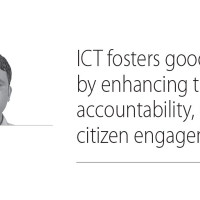- Friday, 3 May 2024
Transformative Potential Of Generative AI
Generative AIs are ubiquitous, and tools like ChatGPT, Gemini and Co-pilot are omnipresent. The development of tools such as ChatGPT, MidJourney and Anthropic is accelerating the adoption of GenAI as a general purpose technology (GPT). These GPTs are finding applications in our daily lives, and will become an integral part of the social and economic systems. Electricity, internal combustion engines, wireless communication, vaccines and computers are all examples of general purpose technologies. I recently came across a GBK Collective report - taking a pulse on generative AI. The report was published six months ago and the data was collected towards the end of summer of 2023.
What surprised me was the percentage of the high level executives acknowledging the role of GenAI in their work - a striking 58 per cent of the respondents from commercial organisations with more than 1,000 employees were indicating that a technology that debuted less than a year ago has found a place in their decision making. In a more recent survey report from Andreessen Horowitz, the findings are even more striking - organisations are increasingly allocating more budget to GenAI not as a research and development project but as allocations that are measured with ROI (return on investment). The pace at which this technology adoption is happening at the enterprises level is astounding and it may just be the beginning.
Impacts
The potential impacts of AI in transforming the global economy is highlighted by the International Monetary Fund report - Gen-AI: Artificial Intelligence and the Future of Work published earlier this year. The report identifies almost 40 per cent of global employment being exposed to AI. The impacts are much bigger in advanced economies with as much as 60 per cent of jobs likely to be impacted followed by 40 per cent in the emerging markets and 26 per cent in low income economies. Whatever may be the exposure, the use of AI and more specifically GenAI to support in decision making is increasing.
I believe JPMorgan Chase Chief Executive Officer Jamie Dimon’s prediction of four-day work week for the next generation will come at the efficiency gain from the GenAI. Below are some of the tasks that GenAIs perform impressively.
Give GenAI like ChatGPT or Autopilot an excel file and ask it to make charts, build a regression equation, find alternatives for missing data, build summary tables, etc. You can use GenAI the way you want it. Just tell it precisely what to do, and it will perform many financial analyses with amazing accuracy. Currently these tasks are performed by people with specific skills, and GenAI is likely to augment this sector faster than those that require a human touch. The cost savings in these sectors could be a driving factor for adopting GenAI.
While many may disagree saying that machines cannot be creative and that artistic creativity cannot be programmed. Today a large amount of text content is generated by AI. So much so that students use it to write essays, musicians are using it to aid in composing and digital art service providers have embedded these into their solutions. You can write a story and applications like Midjourney, Stable Diffusions and Dalle can make images to go with the stories. There is a whole new gamut of GenAI that are now creating short videos- one such was recently released by OpenAI called Sora and the other by Google called Lumiere.
The impact of GenAI in healthcare is very transformative. Though the GenAI impacts on client facing healthcare services are slower than other industries due to stringent regulations, it is breaking barriers with applications ranging from patient diagnosis to treatment recommendations and drug discovery. One of the biggest features of GenAI is its ability to synthesise and summarise large volumes of data in meaningful ways. This has provided impetus for faster drug discoveries, detecting anomalies in a variety of data types (images/texts/videos) and leading to early detection of conditions like cancer and Alzheimer's. GenAI is also finding niche solutions in personalised medicine by tailoring treatment plans to individual genetic profiles, enhancing the efficacy of treatments and minimising side effects.
GenAI impact on customer service through the deployment of advanced chatbots and virtual assistants is already providing better ROIs for businesses than the business as usual practices. These AI-driven systems built to handle a wide array of customer requests that previously required human labor, are redefining the entire customer experience. Businesses are actively working to leverage GenAI to improve customer satisfaction while reducing operational costs.
An innovative application of GenAI is the creation of synthetic customers to test product market fit. Businesses can simulate interactions with AI-generated personas that mimic potential customers, gathering valuable feedback on their products or services before launch. This approach offers a cost-effective method to refine products, tailor marketing strategies, and predict customer behaviour, potentially revolutionising the way companies approach market research.
Ubiquity
In conclusion, the ubiquity of GenAIs across various sectors underscores their transformative potential. From enhancing efficiency and accuracy in healthcare to revolutionising customer service and accelerating medical research, the applications are vast and growing. As GenAI continues to evolve, it will undoubtedly shape the future of work, creativity, and innovation, making Jamie Dimon's prediction of a shorter workweek a plausible reality through efficiency gains.
However, as we embrace these advancements, it is crucial to address the ethical considerations and ensure that the benefits of GenAI are equitably distributed across society. While concerns about authenticity and bias exist, the potential for this technology to democratise access to information and provide deeper insights into complex issues is undeniable.
(The author is a senior data scientist at a publicly traded company in the US.)
















